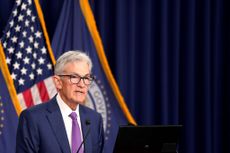Here's Why You Shouldn't Put All Your Money Into Roth IRAs
Converting a tax-deferred account to a Roth can be a good strategy for lowering future taxes, but moving all of your money at once is typically not recommended.


If you follow the content I write for Kiplinger, you may have read one of my previous articles, I Love Roth IRAs and Roth Conversions! That title is still true, but it comes with a caveat: You typically don’t want to put all your eggs in one basket.
When I ask our clients where they have their life savings, they usually don’t say they have it all in one asset class, like bitcoin or a 401(k). Instead, they typically have their savings spread out among different investment options. This is smart planning; after all, one of the fundamentals of investing is diversifying to reduce risk.
But when we dig deeper, we often see that many of the people who schedule a time with us, who are typically between the ages of 55 and 70 and are in or near retirement, have all their money in tax-deferred accounts, like a 401(k) or traditional IRA — and they’re starting to think about future taxes. They may be contemplating moving all their money to tax-free accounts in an effort to reduce their tax bill in retirement.

Sign up for Kiplinger’s Free E-Newsletters
Profit and prosper with the best of expert advice on investing, taxes, retirement, personal finance and more - straight to your e-mail.
Profit and prosper with the best of expert advice - straight to your e-mail.
Yes, converting tax-deferred accounts to tax-free options (like a Roth IRA) can be a good strategy for lowering your future tax bill. However, we don’t usually recommend moving all your money at once.
Instead, we usually recommend moving small amounts over time while keeping in mind that today’s tax rates may be lower than future rates. One strategy we look at is a Roth conversion, which I believe to be one of the strongest tax-planning opportunities today.
The intricacies of a Roth conversion
A Roth conversion isn’t as easy as it sounds, but it is simple to understand. If you move money from a tax-deferred account (like an IRA) to a tax-free account (Roth IRA), then you must pay the taxes on the converted amount now. The advantage is that the investment will grow tax-free moving forward.
The other advantage is that you get to decide when to pay those tax rates vs Uncle Sam forcing you to take money from those accounts when you reach required minimum distribution age (either 73 or 75, depending on your birth year). Some people get excited thinking that paying all their taxes now at the lower rates will set them up for success later.
But I want to make it very clear: The key is to pay your taxes at the lowest rate possible. If you convert everything now, you could jump into the highest income tax bracket. This move may not be the right one for you if you see yourself in a lower tax bracket in the future, even if tax rates increase.
How do you know when you’ll pay the least in taxes? We can’t pinpoint it exactly; after all, we can’t foresee what tax rates and brackets will be 10, 20 or 30 years from now. However, we can analyze a specific situation to see what makes sense. We can also be aware of potential events impacting tax rates. For example, we know that some of the provisions in the Tax Cuts and Jobs Act are set to expire in 2025, and tax rates will revert to their higher 2017 levels, unless Congress acts first. As a result, we see 2024 and 2025 as a window of opportunity to do some tax planning and take advantage of potentially lower rates.
Other tax-planning options
Another reason why it may not make sense to convert everything today: There may be other tax-planning opportunities to take advantage of. For example, the standard deduction allows you to take a certain amount of money each year as income and not pay taxes on it. (In 2024, this amount is $14,600 for those who are single or married and filing separately, $21,900 for head of household and $29,200 for married filing jointly.) Taxpayers will want to take the amount matching the standard deduction from their tax-deferred investments since they won’t have to pay taxes on it.
A third reason why it may not make sense to convert everything now is that you could miss out on future charitable giving opportunities. One strategy we like to use with our clients who are age 70½ or older is called a qualified charitable distribution (QCD). This is an opportunity to move money from an IRA directly to a charity without incurring a taxable event. Once you reach the age where you need to start RMDs, you can direct your RMD to the charity and avoid bumping up your taxable income (and subsequently your tax bill).
Keep an eye on health care costs
Finally, converting everything now could impact how much you pay for health care in retirement. Certain medical expenses can be taken as itemized deductions. If you have a year with significant health-related costs, that money could be taken from your taxable account and then offset with the itemized deduction. Additionally, if you convert to a Roth before the age of 65 and you have insurance through the Affordable Care Act, you could end up paying more in health insurance premiums than planned.
For our clients, we typically aim to keep $300,000 to $500,000 in tax-deferred investments to utilize the benefits listed above. However, that recommendation may change if they have a pension and/or find themselves unable to utilize the standard deduction. In those cases, it may make sense to convert more. For people with $3 million or more in tax-deferred investments, then getting to that low of a number may not be realistic. We typically look to diversify between the two options (tax-deferred and tax-free), since they will likely always be in higher tax brackets because of RMDs in the future.
The important takeaway is that each individual’s situation is different — and what works for one person may not work for another. It’s important to seek out personalized guidance for your specific situation and goals.
Related Content
Get Kiplinger Today newsletter — free
Profit and prosper with the best of Kiplinger's advice on investing, taxes, retirement, personal finance and much more. Delivered daily. Enter your email in the box and click Sign Me Up.

As Founder and CEO of Peak Retirement Planning, Inc., Joe Schmitz Jr. has built a comprehensive retirement planning company focused on helping clients grow and preserve their wealth. Under Joe’s leadership, a team of experienced financial advisers use tax-efficient strategies, investment management, income planning and proactive health care planning to help clients feel confident in their financial future — and the legacy they leave behind. Joe has also written an Amazon bestselling book, titled I HATE TAXES (request a free copy). You can find Joe on YouTube by clicking here, where he creates educational videos for those in or near retirement. If you would like to talk to Joe’s team, you can schedule a call by clicking here.
-
 Federal Reserve Meeting: Updates and Commentary
Federal Reserve Meeting: Updates and CommentaryKiplinger experts provide commentary and analysis on the November Federal Reserve meeting.
By Kiplinger Staff Last updated
-
 Market Reaction to Election Results: What the Experts Are Saying
Market Reaction to Election Results: What the Experts Are SayingJobs Report Election uncertainty has been removed from the list of investors' worries, helping equities soar.
By Dan Burrows Published
-
 Federal Reserve Meeting: Updates and Commentary
Federal Reserve Meeting: Updates and CommentaryKiplinger experts provide commentary and analysis on the November Federal Reserve meeting.
By Kiplinger Staff Last updated
-
 Market Reaction to Election Results: What the Experts Are Saying
Market Reaction to Election Results: What the Experts Are SayingJobs Report Election uncertainty has been removed from the list of investors' worries, helping equities soar.
By Dan Burrows Published
-
 Should You Buy Tesla Stock After Trump's Election Win?
Should You Buy Tesla Stock After Trump's Election Win?Shares in Tesla popped on the outcome of the presidential election. Is it time to buy?
By Dan Burrows Published
-
 Two Consequential Tax Cases You May Not Have Heard About
Two Consequential Tax Cases You May Not Have Heard AboutThe Supreme Court's decisions in these cases create uncertainty about challenging IRS regulations and guidance. Expect more litigation to follow.
By John M. Goralka Published
-
 Stock Market Today: Stocks Rise Amid a Broad-Based Election Day Rally
Stock Market Today: Stocks Rise Amid a Broad-Based Election Day RallyAll 11 sectors closed in the green on Tuesday, and all three major indexes added more than 1%.
By David Dittman Published
-
 Stocks Rally on Election Day as Markets Brace for Volatility
Stocks Rally on Election Day as Markets Brace for VolatilityAll three major indexes opened higher as voters chose the 47th President of the United States.
By Dan Burrows Published
-
 Are You an Estate Planning Procrastinator? Where to Start
Are You an Estate Planning Procrastinator? Where to StartQuit putting it off, because it's vital for you and your heirs. From wills and trusts to executors and taxes, here are some essential points to keep in mind.
By Alex Diaz, MBA, CFP® Published
-
 Write a Book in One Day and Become a Best-Selling Author!
Write a Book in One Day and Become a Best-Selling Author!If that sounds like a scam, that's because it is. Online publishing scams entice wannabe authors with big promises for a big price. How to protect yourself.
By H. Dennis Beaver, Esq. Published